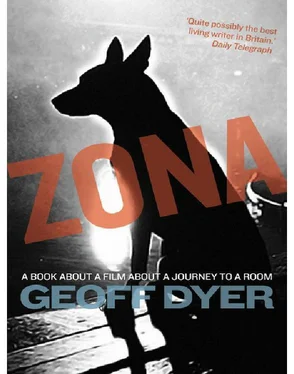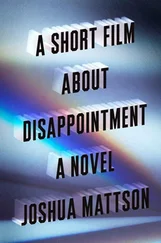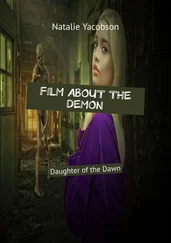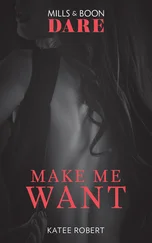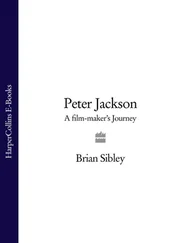46Looking back on the sequence when Stalker is lying in water and the dog comes up to him, director of photography Knyazhinsky remarks fondly that this ‘fantastic dog’, who only understood commands in Estonian, ‘literally worked miracles’: a real Zone dog!
47In a sense Stalker’s book collection is also Tarkovsky’s: ‘Only that which I would like to have in my home has the right to find itself in a shot of one of my films,’ he said in an interview. ‘If the objects are not to my liking, I simply cannot allow myself to leave them in the film.’ (Bresson puts the emphasis on the things themselves: ‘Make the objects look as if they want to be there.’)
48It’s also further evidence of what Tarkovsky said about only using things in his films that he would have in his own house: the same cuckoo clock puts in an audio appearance in Mirror when the children run out of the house to see the fire.
49A lovely offer, reminiscent of the one my mum once made on behalf of my dad. Owing to an unlucky turn of events at school I seemed, in the sixth form, to have no friends. I had no one to go to the pub with and my mum said that my dad would go out for a drink with me, an idea I knew would not appeal to him as it would have involved spending money, which he hated, and going to the pub, which he never liked.
50That Tarkovsky intended something like this — Stalker and his wife as stand-ins for his own sense of persecuted devotion — seems especially likely given that he wanted Larissa to play the part but was dissuaded by Rerberg and co., who lobbied successfully for Alisa Freindlikh. Her tocamera monologue was originally intended to go at the beginning; only late in the process of shooting the third version did Tarkovsky decide to put it here, as a kind of epilogue.
While Tarkovsky may have seen himself as a Stalker — a persecuted martyr taking us on voyages into a Zone where ultimate truths are revealed — he also became identified with the destination itself. There is a poignant moment in an interview with the terminally ill production designer Rashit Safiullin, who, when asked about the Zone, recalls the time he spent living, working and talking with Tarkovsky: ‘Here you live being your inmost self…it’s somewhere where you can talk with somebody, something unfathomable.’ The interviewer asks him to clarify. Does he mean…? ‘Yes, speaking with god. When Andrei was no more I was bereaved of a person with whom I could talk about the most important things. That room vanished.’ ‘So he was the Room to you?’ asks the interviewer. ‘Yes.’
51Bjork got the lyrics to her song ‘The Dull Flame of Desire’—on the album Volta —from the English translation of this poem, acknowledging Stalker as the source.
52Extraordinary, the way that this film continues to creep into my life in the most unexpected ways. In the last several years I’ve taken to listening to ambient music— William Basinski, Stars of the Lid, that kind of stuff— while working (the drone, the lack of beat, is an aid to concentration). I’d listened to the Lids’ album The Tired Sounds Of dozens of times and had always liked the funny moment, on ‘Requiem for Dying Mothers, part 2’, when a dog starts whining (just as I’d liked the dog barking on one of the recordings of Dylan’s ‘Every Grain of Sand’). I assumed a dog had somehow strayed into the studio and the Lids had decided to retain the intrusion as a random bit of canine backing vocals. Then, listening to it as I was writing about this scene, I realized the sound of the dog whimpering was preceded by a slight scraping noise. I listened to it again. And again. There could be no doubt, there was nothing accidental about it: the Lids had sampled the sound of the dog whining in response to the glass moving along the table!
53Apparently Tarkovsky personally dragged it with a piece of discreetly painted string.
54Sound recordist Vladimir Sharun gives a full account of how the film came to end like this: ‘Thanks to Tarkovsky’s passion for anything out of the ordinary a man called Eduard Naumov somehow ended up within our circle…Once Naumov showed us one of his films. The film showed Ninel Sergeyevna Kulagina [who] discovered she had an ability for telekinesis — she moved objects with her sight. On the screen Kulagina, surrounded by a group of people looking like scientists, was sitting behind a table with a transparent top — to avoid any claims of forgery. On the table there was a lighter, a spoon, some other items. Kulagina’s face darkened with exertion, she fixed her unblinking stare on the lighter which followed her gaze. Tarkovsky attentively watched Naumov’s film and after it was finished he immediately exclaimed: “Well, what do you say, here is the ending for Stalker !”’
The Steamroller and the Violin (1960)
Ivan’s Childhood (1962)
Andrei Rublev (1969)
Solaris (1972)
Mirror (1974)
Stalker (1979)
Tempo di Viaggio (1980)
Nostalghia (1983)
The Sacrifice (1986)
DOCUMENTARIES ABOUT— AND FILMIC HOMAGES TO — TARKOVSKY
Moscow Elegy, directed by Aleksandr Sokurov, 1987.
One Day in the Life of Andrei Arsenevich, directed by Chris Marker, 2000. Rerberg and Tarkovsky: The Reverse Side of ‘Stalker’, directed by Igor
Maiboroda, 2008. Ajapeegel, directed by Jeremy Millar, 2008.
BOOKS BY TARKOVSKY
Sculpting in Time, translated by Kitty Hunter-Blair (London: Bodley Head, 1986).
Time Within Time: The Diaries 1970-86, translated by Kitty Hunter-Blair (London: Faber & Faber, 1994).
Collected Screenplays, translated by William Powell and Natasha Synessios (London: Faber & Faber, 1999).
Instant Light: Tarkovsky Polaroids, edited by Giovanni Chiarmonte and Andrey A. Tarkovsky (London: Thames and Hudson, 2004).
BOOKS ABOUT TARKOVSKY
Robert Bird, Andrei Tarkovsky: Elements of Cinema (London: Reaktion, 2008).
Nathan Dunne (ed.), Tarkovsky (London: Black Dog, 2008).
John Gianvito (ed.), Andrei Tarkovsky Interviews (Jackson: University Press of Mississippi, 2006).
Vida T. Johnson and Graham Petrie, The Films of Andrei Tarkovsky: A Visual Fugue (Bloomington: Indiana University Press, 1994).
Mark Le Fanu, The Cinema of Andrei Tarkovsky (London: BFI, 1987).
Marina Tarkovskaya (ed.), About Andrei Tarkovsky: Memoirs and Biographies (Moscow: Progress Publishing, 1990).
WEBSITE
nostalghia.com
There are some unacknowledged quotations and misquotations in the text. Sources for these are listed here, along with the ones that were conventionally presented.
‘THE WORST OF HIS FILMS,’ etc.: interview with Maria Chugnova in Tarkovsky, Time Within Time.
‘A RING AT THE DOOR’: Edmond and Jules de Goncourt, Pages from the Goncourt Journals, edited by Robert Baldick (New York: NYRB Classics, 2007).
‘IF THE REGULAR LENGTH’: quoted by Vladimir Goldstein in Nathan Dunne (ed.), Tarkovsky.
‘A LITTLE MORE DYNAMIC’: quoted by Evgeny Tsymbal in Dunne, ibid.
‘I THINK THAT’: Tarkovsky, Sculpting in Time.
‘NINETY MINUTES OF SITTING’: Richard Price, Clockers (London: Bloomsbury, 2003; first published 1992).
‘THE WORLD OUTSIDE’: Anne Applebaum, Gulag: A History (New York: Doubleday, 2003).
‘A WAY OF LIFE’: Tony Judt, Postwar (London: Heinemann, 2005).
Читать дальше
